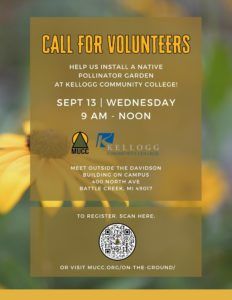Give it Time, They’ll Grow on You: The Importance of Late Blooming Flowers
Often when you think of flowers blooming we first think of spring as the warmth melts away the last bits of snow. We might even think of summer as multiple species of wildflowers begin blooming, but do you think about late summer and the fall for blooming flowers? Wildflowers such as Goldenrods and Asters bloom during this time and play a pivotal role for our pollinators.

Many bumble bee species are busy producing new queens for the next year and will need food to help them survive their hibernation through the winter. That’s where our late blooming flowers help, as the new queens feed to build up their energy reserves. Planting late-blooming plants in gardens can provide resources to these bees and other pollinators making a final food dash at the end of the growing season.
You can help our pollinators by volunteering with On the Ground on Sep 13, 2023. We’ll be installing a native pollinator garden at Kellogg Community College in Calhoun County. If you’re interested please register HERE .
Our bee friends and I hope to see you there!
The post Give it Time, They’ll Grow on You: The Importance of Late Blooming Flowers appeared first on Michigan United Conservation Clubs.
Recent Posts



